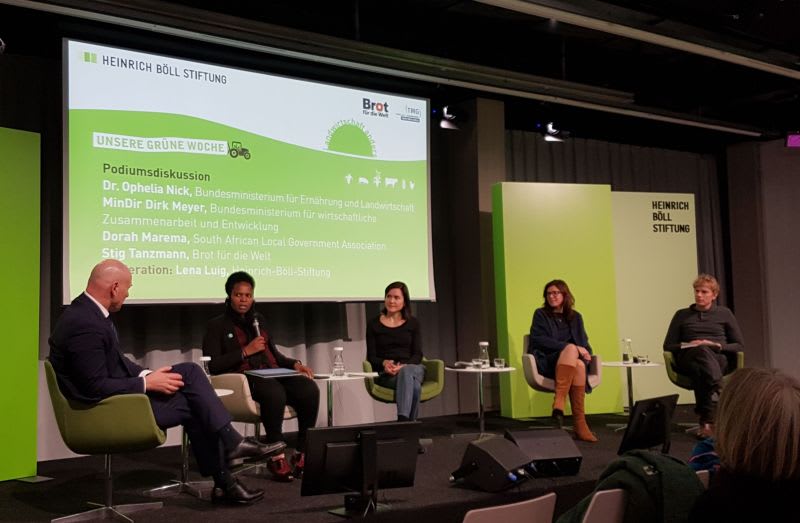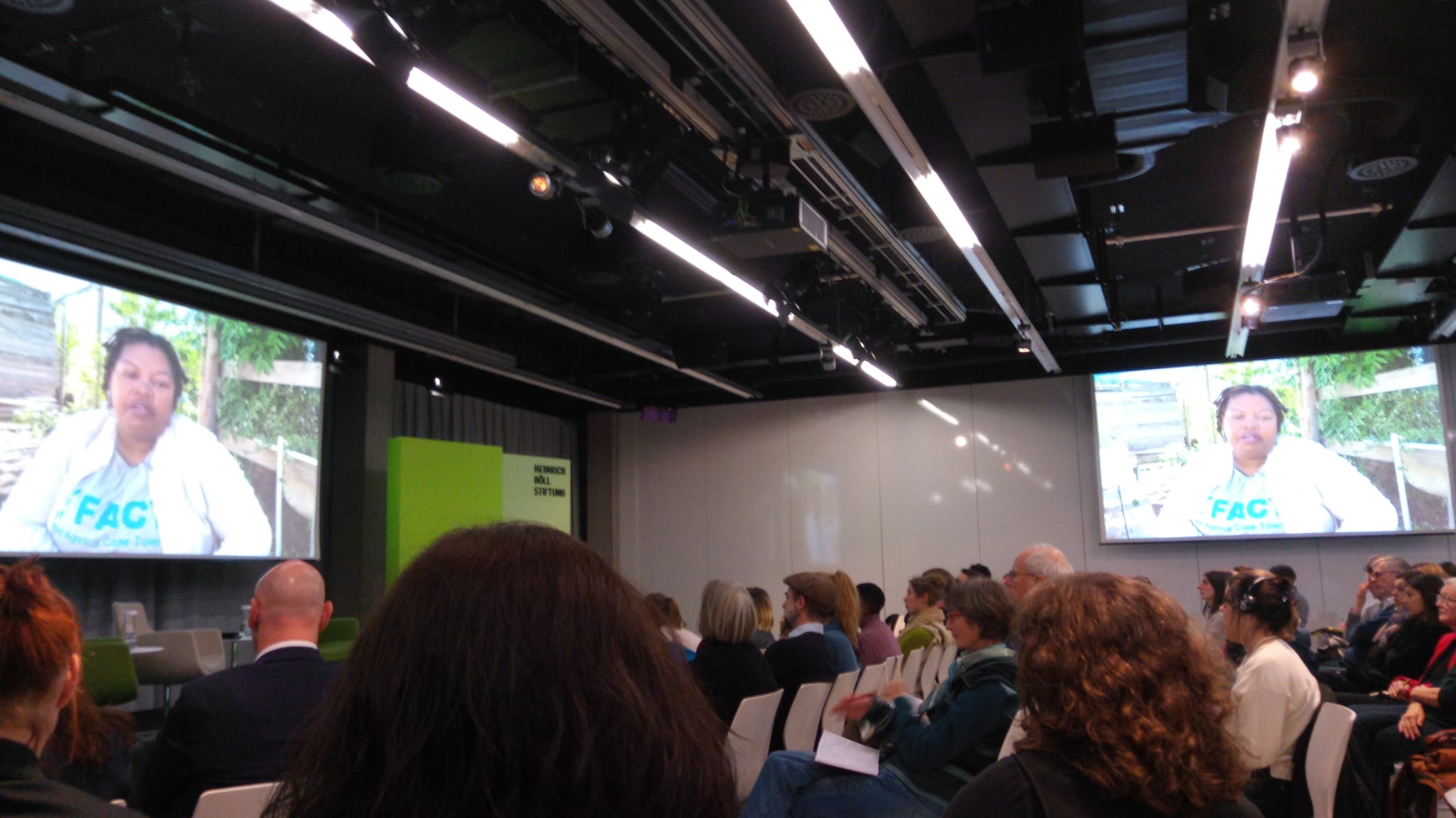Business as usual will not fix urban food system crisis: A call to prioritize local voices
Berlin meeting examines gaps between international policy intentions and implementation on the ground
by Sanelisiwe Siyotula-Tschappe | 2023-01-26

On 17 January 2023, the Henrich Boell Foundation, in partnership with TMG Research and Bread for the World Germany hosted a panel discussion during the International Green Week in Berlin. Titled: Food Systems in Crisis - Overcoming neo-colonial dependencies, the discussions zeroed in on the crisis of global urban food systems by examining why policy formation continues to be prioritized over local policy implementation.
Through separate pre-recorded videos made for the panel, the stage for the discussion was set by the UN Special Rapporteur on the Right to Food, Michael Fakhri, and members of TMG research partner organization Food Agency Cape Town (FACT), South Africa.
In his message, Fakhri outlined how the continued violence of global food systems emanated from extractive economies and relationships of dependencies that undermine the realization of the right to food. FACT provided a multi-voice perspective on Cape Town's food crisis at the height of the Covid-19 pandemic, highlighting interlinkages between the prevalence of hunger, neglect of community agency and the overlooked role of youth.

FACT highlighted how Covid-19 related food insecurity illuminated what was already an acute and prevalent food crisis in the city. Across the Cape Flats, FACT explained, hunger has adopted a young and urban face that is largely addressed by unpaid and overlooked female and community-based labour. In addition to trying to tackle growing hunger, women also face multiple social issues such as domestic violence, unemployment and limited skills development. Going beyond these challenges, as FACT's analysis shows, is the deep-rooted stigma attached to this generational and gendered characterization of food insecurity. FACT members featured in the video explained that one of the ways in which such stigma is manifested is in the neglect of community initiatives by local authorities. For example, efforts by women-led community kitchens to tackle hunger were not only left out of municipal and provincial government planning and resource distribution processes, but women continued to face physical and emotional abuse from detractors within the community.
Coming to terms with systemic policy neglect of local voices
Guided by the rich insights highlighted in the opening messages, the in-person discussion kicked off with Dr. Ophelia Nick, the State Secretary at the German Federal Ministry of Food and Agriculture (BMEL), and Dirk Meyer, Head of Division, for the Federal Ministry for Economic Cooperation and Development (BMZ). The high-level policy makers noted that the perspectives shared in the opening videos served to confirm that the continuing deep impact of multiple global crises, including climate, energy and food prices, has been felt in almost every country by reducing incomes and disrupting food supply chains. Beyond outlining advances in bilateral and multilateral policies made by the two ministries in response to these jolts, Nick and Meyer reflected on how Germany and Europe could play a more active global role to mitigate hunger, as well address as the deeper social policy issues that exacerbate food insecure food systems.
Dorah Marema, Head of Municipal Sustainability at the South African Local Government Association (SALGA) emphasized how such policy efforts, despite their good intentions between states, would continue to be undermined locally in times of crises unless local authorities, local communities and local experiences, as FACT had demonstrated, were brought to the policy table. Marema explained how in the case of South Africa, the failure of policy was not its intentions but rather the lack of an purposeful link between policymakers at the bilateral and multilateral levels and local implementers.
Marema continued to state that even with the existence of good policy, local implementers such as the community organizations engaged by FACT not only lacked clarity from municipal, provincial or state authorities on the intended action of multilateral and bilateral policy, but at times never even encountered the investments or resources that emanated from such agreements. This challenge, Marema argued cannot be solely attributed to a lack of capacity or competency across the state, provincial or municipal government levels. For Marema, the challenge was in part maintained by an oversight or refusal of state representatives when engaged in the policy making task to seriously prioritize the needs of those already active in achieving constitutional rights such as the right to food in communities. For Marema therefore, this gap between policy makers and policy implementers underscored the tendency by policy makers of prioritizing the exercise of policy making over the objective of its implementation.
Speaking from a German civil society perspective, Stig Tanzmann, Adviser on Agricultural Issues at Bread for the World Germany, stated that while global and national policy concerning food systems had indeed advanced in the face of recent crises, the concern was that bilateral and multilateral policy making revolving lacked the courage to be implemented seriously. Instead, he stressed, support continues to rely on non-inclusive institutional arrangements, such as the G7 and the World Bank. He noted that these mechanisms continually fail to uphold the right of civil society and local authorities to co-determine reformed food systems, despite being the best placed to innovate and demonstrate more socially inclusive solutions to attain the right to food.
While the conversation did manage to unpack gaps between food system policy making and implementation, the sentiment expressed by many in the audience was that the deeper neo-colonial dependencies that drive the current global food system crisis were not addressed. Despite efforts by Henrich Boell facilitator Lena Luig to tackle these uncomfortable truths, the challenge, as highlighted by both Fakhari and Tanzman is the persistent discomfort among decision makers to explicitly name neo-colonial dependencies in order to critically engage with them. This discomfort, Marema echoed, is brought to “the policy table” and is what informs the conscious or unconscious neglect of local experiences.
How can food system programmes face up to uncomfortable truths?
For TMG's Urban Food Futures programme, a crucial step towards overcoming neo-colonial dependencies is for policy makers in the global north to confront the highly unequal international capitalist systems in which “rich country-poor country” food system relationships are still embedded. As pointed out by various panelists, confronting such dependencies hinges on understanding the violence that these inherited dependencies yield, not just the state and provincial policy level but at the local level as well. Addressing this violence necessitates addressing this systemic neglect of the lived experience of local communities by recognizing such community-led perspectives in policy making and resourcing.
TMG’s Urban Food Futures transdisciplinary action-research programme seeks to address the policy making-policy implementation gap by actively working with partners in three African cities to explore how to valorize local solutions, especially in the informal economy. In Cape Town, TMG partner FACT mobilizes dialogues in the Cape Flat communities to unpack and address the root causes of food insecurity.
 Urban Food FuturesFeb 09, 2026
Urban Food FuturesFeb 09, 2026Pushing the horizon: Urban farming and community-led innovation in Mukuru informal settlement
A small community-run greenhouse in Mukuru is offering insights into how controlled-environment agriculture can strengthen food security in urban environments under increasing pressure—and a look into the future of food systems in informal settlements.
Christian Sonntag, Emmanuel Atamba, Lumi Youm
 Land GovernanceDec 18, 2025
Land GovernanceDec 18, 2025Land tenure, women’s land rights, and resilience: Reflections from CRIC23 toward UNCCD COP17
Our experts discuss what the exchanges at CRIC23 highlighted and revealed about the role of secure and gender-equitable land tenure in the UNCCD's work ahead of the 2026 triple COP year.
Frederike Klümper, Washe Kazungu
 Urban Food FuturesDec 09, 2025
Urban Food FuturesDec 09, 2025The story of Mukuru's Urban Nutrition Hub
In Mukuru informal settlement, a safe haven for women has grown into the Urban Nutrition Hub, a multi-purpose space for nutrition education, training, and community development, demonstrating the potential of grassroots community-owned innovation..
Serah Kiragu-Wissler


